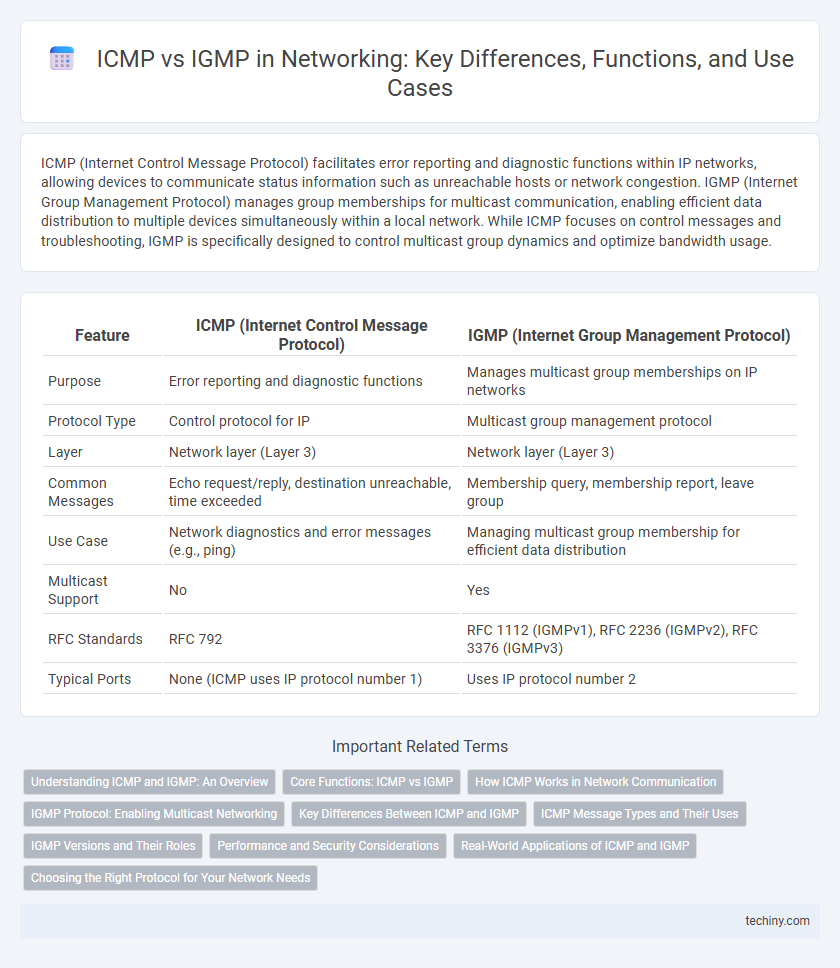ICMP (Internet Control Message Protocol) facilitates error reporting and diagnostic functions within IP networks, allowing devices to communicate status information such as unreachable hosts or network congestion. IGMP (Internet Group Management Protocol) manages group memberships for multicast communication, enabling efficient data distribution to multiple devices simultaneously within a local network. While ICMP focuses on control messages and troubleshooting, IGMP is specifically designed to control multicast group dynamics and optimize bandwidth usage.
Table of Comparison
| Feature | ICMP (Internet Control Message Protocol) | IGMP (Internet Group Management Protocol) |
|---|---|---|
| Purpose | Error reporting and diagnostic functions | Manages multicast group memberships on IP networks |
| Protocol Type | Control protocol for IP | Multicast group management protocol |
| Layer | Network layer (Layer 3) | Network layer (Layer 3) |
| Common Messages | Echo request/reply, destination unreachable, time exceeded | Membership query, membership report, leave group |
| Use Case | Network diagnostics and error messages (e.g., ping) | Managing multicast group membership for efficient data distribution |
| Multicast Support | No | Yes |
| RFC Standards | RFC 792 | RFC 1112 (IGMPv1), RFC 2236 (IGMPv2), RFC 3376 (IGMPv3) |
| Typical Ports | None (ICMP uses IP protocol number 1) | Uses IP protocol number 2 |
Understanding ICMP and IGMP: An Overview
ICMP (Internet Control Message Protocol) and IGMP (Internet Group Management Protocol) serve different roles in network communication. ICMP is primarily used for error messaging and operational queries, such as ping requests and diagnostics, while IGMP manages multicast group memberships within IPv4 networks. Understanding their distinct functions is essential for optimizing network performance and troubleshooting connectivity issues.
Core Functions: ICMP vs IGMP
ICMP (Internet Control Message Protocol) primarily facilitates error reporting and diagnostic functions for IP networks, ensuring efficient communication by informing devices of network issues like unreachable destinations or packet loss. IGMP (Internet Group Management Protocol) manages multicast group memberships, enabling routers to efficiently distribute multicast traffic only to interested receivers within a subnet. While ICMP operates at the network layer to maintain network health, IGMP functions to optimize multicast data delivery across IP networks.
How ICMP Works in Network Communication
ICMP (Internet Control Message Protocol) operates by sending error messages and operational information between network devices to facilitate troubleshooting and control. When a packet encounters issues like unreachable destinations or time exceeded, ICMP generates specific messages such as Destination Unreachable or Time Exceeded to inform the source device. This protocol functions at the network layer and is essential for maintaining efficient IP communication by diagnosing connectivity problems.
IGMP Protocol: Enabling Multicast Networking
IGMP (Internet Group Management Protocol) enables efficient multicast networking by managing group memberships on IPv4 networks, allowing routers to identify devices interested in receiving specific multicast traffic. Unlike ICMP, which primarily handles error messages and diagnostic functions, IGMP facilitates the delivery of data streams to multiple hosts simultaneously, optimizing bandwidth utilization. IGMP operates in three versions--IGMPv1, IGMPv2, and IGMPv3--each enhancing group management capabilities and supporting features like source-specific multicast in IGMPv3.
Key Differences Between ICMP and IGMP
ICMP (Internet Control Message Protocol) primarily handles error reporting and operational information for IP network devices, ensuring efficient communication via messages like destination unreachable and echo requests. IGMP (Internet Group Management Protocol) manages multicast group memberships on IPv4 networks, enabling routers to establish and maintain multicast group lists for efficient data distribution. While ICMP supports network diagnostics and error handling, IGMP facilitates multicast traffic control, reflecting their distinct roles in network management.
ICMP Message Types and Their Uses
ICMP (Internet Control Message Protocol) includes message types like Echo Request and Echo Reply used for network diagnostics through tools such as ping. Destination Unreachable messages inform the sender when a packet cannot reach its destination due to routing issues or access restrictions. Time Exceeded messages indicate that a packet's Time-to-Live (TTL) has expired, helping trace routing loops and delays in network paths.
IGMP Versions and Their Roles
IGMP (Internet Group Management Protocol) versions include IGMPv1, IGMPv2, and IGMPv3, each enhancing multicast group management capabilities in IP networks. IGMPv1 supports basic group membership reporting, IGMPv2 introduces leave group messages and faster group management, while IGMPv3 adds source-specific multicast support, enabling hosts to specify which sources they wish to receive traffic from. These versions play crucial roles in optimizing multicast traffic delivery and improving network efficiency.
Performance and Security Considerations
ICMP (Internet Control Message Protocol) primarily handles error messages and diagnostic functions, which ensures efficient network management but can be exploited for Denial of Service (DoS) attacks, impacting security. IGMP (Internet Group Management Protocol) manages multicast group memberships, optimizing bandwidth by reducing unnecessary traffic, yet it requires robust filtering to prevent unauthorized group access and related security risks. Performance in ICMP is generally faster for unicast messaging, whereas IGMP's efficiency shines in multicast environments, demanding tailored security measures for each protocol's specific vulnerabilities.
Real-World Applications of ICMP and IGMP
ICMP (Internet Control Message Protocol) is primarily used for diagnostic and error-reporting purposes in IP networks, enabling tools like ping and traceroute to monitor network connectivity and troubleshoot communication issues. IGMP (Internet Group Management Protocol) facilitates efficient multicast group management, allowing routers and switches to manage multicast traffic for applications such as video conferencing, streaming media, and real-time data distribution. Real-world implementations of ICMP include network performance analysis and fault detection, whereas IGMP is essential for optimizing bandwidth in multicast-dependent services within enterprise and ISP environments.
Choosing the Right Protocol for Your Network Needs
ICMP (Internet Control Message Protocol) is essential for error reporting and diagnostic functions in IP networks, while IGMP (Internet Group Management Protocol) manages multicast group memberships. Selecting ICMP suits scenarios requiring network diagnostics and error communication, whereas IGMP is optimal for efficient multicast traffic management in streaming or real-time applications. Understanding your network's traffic patterns and communication requirements is critical for deploying the appropriate protocol to optimize performance and resource utilization.
ICMP vs IGMP Infographic

 techiny.com
techiny.com